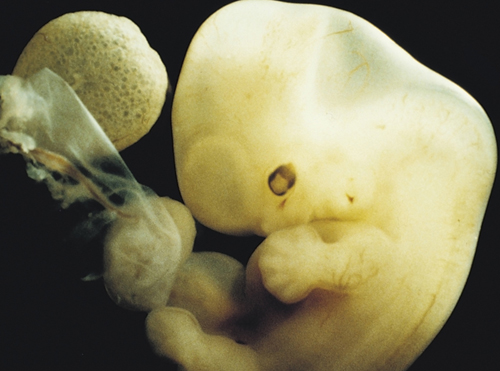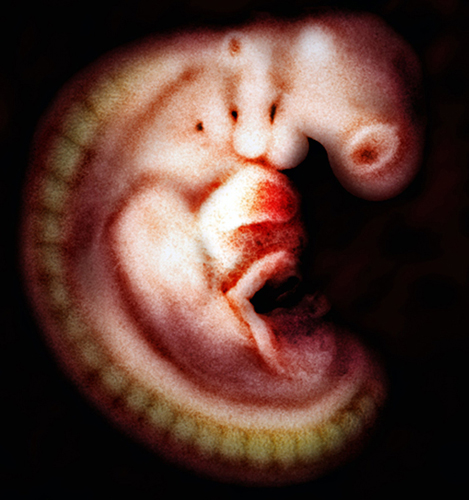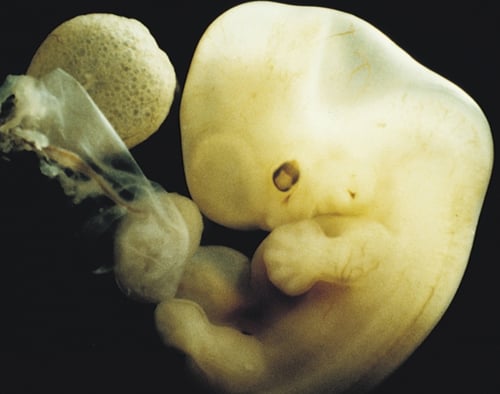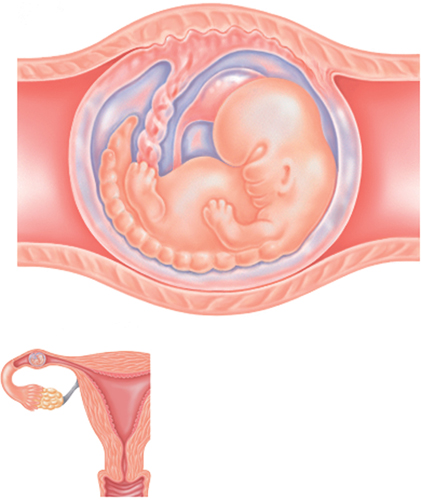You are 6 Weeks and 2 Days 236 days to go…
Try not to dwell on your lifestyle before you realized you were pregnant, but start making changes now.
Your baby today
The first recognizable facial feature to be formed is the eye,
visible as a black dot in the center of this image. The gray areas are
the fluid-filled chambers of the underlying brain.

Have you only just discovered you’re pregnant?
Not all women realize they are pregnant immediately, especially if it
wasn’t planned. If you’ve only just found out, it’s natural to be
concerned about things that you did before you knew, such as drinking
alcohol or taking drugs. You may be worried that you’ve harmed your
unborn baby. Use your pregnancy as an opportunity to assess your
lifestyle and improve your health.
Because of how pregnancy is dated (see This is Day 1 of your Menstrual Cycle), your baby is still only a little over four weeks old. If you have not been taking folic acid, start taking supplements starting today.
Going solo
The prospect of being pregnant and single, especially if it wasn’t your choice, can be tough. Make sure you:
Take care of yourself:
plan a healthy diet, and an exercise routine. Get as much rest and
restful sleep as you can. Ask a friend to spur you on or get online and
seek support from other single pregnant women in your area—you will have
a ready-made support network after the birth.
Ask for help
from family and friends. You will probably find they are delighted to
be involved in your pregnancy and are willing to come to prenatal
appointments and classes with you: you may want to consider asking one
of these people to be your birth partner.
Discuss support and access
with your baby’s father (if appropriate), and if you can’t agree, seek
legal advice. You and your baby will benefit if an amicable arrangement
is reached, and the sooner you start talking, the easier it will be
after the birth.
Arrange support
for after the birth. A survey found that grandparents who are actively
involved in their grandchildren’s lives contribute positively to their
well-being. If you don’t have family close by, try to build a network of
other support that will see you through the early weeks.
Start thinking early
about your career options for after the birth. You don’t have to make
any decisions, but it helps to know some of the choices you may have to
make later.
If you’re single and pregnant, don’t be alone—share the highs and the lows with those close to you.

Prenatal care
The options for prenatal care in the US are outlined in sectionPrenatal Care Options,
but they do vary from area to area. Whatever your type of prenatal
care, any ultrasound scans, tests, and investigations may also take
place at a hospital. Your options are likely to be:
You are 6 Weeks and 3 Days 235 days to go…
Needing to urinate frequently is, unfortunately, one of the unwanted side effects of pregnancy.
Your baby today
The eyes begin life as shallow depressions, one on each side of
the developing face. This image shows an early eye in the center right,
together with the curve of the pale yellow somites of the developing
musculoskeletal system.

Are you spending a lot of time in the bathroom? In addition to dealing with symptoms such as nausea and vomiting,
if you’re like the majority of pregnant women, you’ll need to urinate
more frequently. It means you’re unlikely to want to be too far away
from the nearest bathroom.
It can feel as though
your bladder cannot hold much urine so you may feel the need to go to
the bathroom not long after you’ve just been, during the day and at
night. This is because there is more blood being pumped through the
kidneys so you produce more urine. As your uterus grows, it puts
pressure on your bladder so it cannot expand as much as normal and will
feel uncomfortably full earlier than usual. This can last throughout
pregnancy, though you’re most likely to experience it in the first and
third trimesters.
If, however, you’re
concerned about the amount of urine you’re passing, and/or develop pain
or stinging while passing urine, you may have developed a urinary tract
infection and should see your doctor immediately.
… Doctor
| Q: |
Why do I have so much saliva in my mouth now that I’m pregnant?
|
| A: |
Called pytalism, excess saliva is caused by increased hormone
levels. Don’t try to keep the saliva in your mouth; if you find yourself
drooling, spit into a tissue or small cup. Place a towel on your
pillow. Sucking lemon wedges or ice cubes may help. Pytalism usually
subsides in later pregnancy.
|
… Nutrition
Get carb loading
Make carbohydrates part of your balanced diet,
but make sure you choose the right ones. Refined carbohydrates, such as
white bread and white rice, are very quickly broken down, releasing a
large amount of glucose into the bloodstream. This is quickly used up
and then glucose levels fall rapidly. This fluctuation in glucose levels
has been associated with diabetes, obesity, and heart disease, and
recent data suggests it is not the optimal environment for adult or
fetal health.
Unrefined
carbohydrates, such as whole-wheat bread and brown rice, break down more
slowly, releasing glucose steadily leaving you fuller. This can prevent
the hunger signals that follow a rapidly digested meal and help with
weight control. Your baby is constantly drawing glucose from your
bloodstream, so a steady release of glucose leaves you both with plenty
of fuel on an ongoing basis. New research has found that babies exposed
to a diet based upon unrefined carbs may have more lean body mass and
less body fat, though still a healthy birthweight. This will make them
less likely to be overweight later in life.

You are 6 Weeks and 4 Days 234 days to go…
Your baby’s lungs won’t be fully developed until late in pregnancy, but the foundations are being laid down right now.
Your baby today
The early limb bud that will form your baby’s arm can be seen
here (white area). The upper limb buds appear before the lower limb
buds. At this early stage, the hands and fingers are not yet developed.

In this 7th week of pregnancy,
your baby’s lungs are starting to develop. This begins with a small
lung bud branching out from the upper part of the tube (esophagus)
between your baby’s mouth and stomach. This lung bud forms the main
windpipe or “trachea,” which then divides into two main branches
(bronchi) that will eventually form your baby’s right and left lungs.
These bronchi continue to branch into smaller tubes, a process that will
be repeated many times.
Your baby’s gut is also
starting to develop, from the mouth downward. At the beginning of this
week, his future digestive system consisted of a simple tube that lay
along the length of the embryo; this tube was closed at each end. The
tube remains closed but the esophagus has now started to separate from
the trachea and connect to the stomach. The swelling that will become
your baby’s stomach forms around the center of his body, but undergoes a
90-degree rotation to lie more on the left-hand side.
Buds arise from the
duodenum (the first part of the bowel that leaves the stomach) that will
form the pancreas and bile duct to the gall bladder.
In just a couple of weeks, your baby will have all its major organs and body systems.
Ectopic pregnancy
An ectopic pregnancy
can cause abdominal pain on one side and irregular vaginal bleeding.
Some women get shoulder-tip pain, thought to be caused by internal
bleeding. An ectopic pregnancy can rupture the fallopian tube causing
severe pain. Emergency medical attention is essential.
If an ectopic
pregnancy is suspected, you will be given a scan. Sometimes the
pregnancy will naturally regress; if not medication or surgery will be
necessary.
In an ectopic pregnancy, the embryo develops outside the uterus, usually in a fallopian tube.

Music therapy is a highly effective way to reduce stress.
A study found that
pregnant women who listened to music that mimicked the human heartbeat
had reduced stress levels compared to those who did not receive the
treatment.
Miscarriage
Miscarriage is the
spontaneous loss of a pregnancy before the fetus is mature enough to
survive outside the uterus. Miscarriage is common, affecting 15–20
percent of pregnancies, with the majority occurring in the first 12
weeks. Late miscarriage, after the first trimester, occurs in about 1
percent of pregnancies.
Why miscarriage happens
An early miscarriage is
usually due to a problem such as a chromosomal or structural
abnormality in the fetus. It may also be caused by a fibroid (a
non-cancerous growth in the uterus), an infection, or an immune system
disorder. Miscarriage occurs more commonly in older women, in smokers,
and in multiple pregnancies.
If you miscarry, it’s
important to know that it wasn’t linked to anything you did, such as
exercise, sex, or travel. Also, there is no evidence that rest reduces
the risk of a threatened miscarriage going on to become inevitable (see Diagnosis).
What will be done
If you bleed in early
pregnancy, contact your doctor immediately who will arrange for you to
have a pelvic exam and/or ultrasound scan. If a scan shows a healthy
fetal heart, the chance of miscarriage is reduced. If there is no
heartbeat, or no developing baby, the doctor will assess if you’ve had a
complete or incomplete miscarriage (see Diagnosis).
A complete miscarriage doesn’t require treatment. If it is incomplete,
you may be offered medication to hasten the miscarriage, or a procedure
to scrape the uterus, although your doctor may recommend expectant
management—monitoring the situation while letting your uterus expel its
contents. Expectant management means that you avoid risks such as
infection from an invasive medical procedure, but its disadvantage is
that you may bleed longer. Discuss the options with your doctor.
If you have two or more
miscarriages in a row, known as “repeated miscarriage,” your doctor may
arrange tests to see if there is a cause. About half the time, no cause
will be found but sometimes testing will find fetal chromosomal
problems, uncommon uterine problems, or blood disorders or other medical
conditions.
After a miscarriage
Your period may be
delayed by 6–12 weeks. Once the bleeding stops, there is no medical
reason to not try to get pregnant again. The only problem is that you
may not know if your period is late since your cycle is readjusting
after the miscarriage, or whether you are pregnant again. It’s wise to
wait until you both feel mentally ready to try again. Talking to a close
friend, family member, or a counselor, can help you come to terms with
your loss.
Diagnosis
Types of miscarriage
Different terms are used
to describe miscarriage, depending on what is found during an
ultrasound scan or an internal examination.
Threatened miscarriage
is the term given to bleeding early in pregnancy, but in which the
cervix remains closed. In this case, the bleeding stops after a few
days, and the pregnancy is likely to continue.
Inevitable miscarriage
occurs when there is bleeding and the cervix is open, meaning that the
fetus will be lost. If the pregnancy is less than eight weeks, the
bleeding may be like a heavy, painful period. After eight weeks, the
bleeding may be considerably heavier.
Incomplete miscarriage
occurs when there is bleeding and the cervix opens, but the uterus
doesn’t expel its entire contents and some pregnancy tissue is left
behind.
Complete miscarriage is when there is bleeding, the cervix opens, and the uterus expels all the pregnancy tissues.
Missed miscarriage
is less usual. There may be no miscarriage symptoms, but the pregnancy
stops developing and the miscarriage isn’t diagnosed until the routine
scan at around 12 weeks.
Late miscarriage
Pregnancy loss after the first trimester
Losing a pregnancy after the first trimester is much more unusual than an early miscarriage.
After 20 weeks, a pregnancy loss is referred to as a stillbirth. There
are several reasons why late pregnancy loss may occur, including
infection; uterine abnormalities or abnormalities in the baby; and a
weak cervix. If you have a late miscarriage, your doctor will discuss
the possible causes with you and, if a cause is identified, whether
anything needs to be done in a future pregnancy.